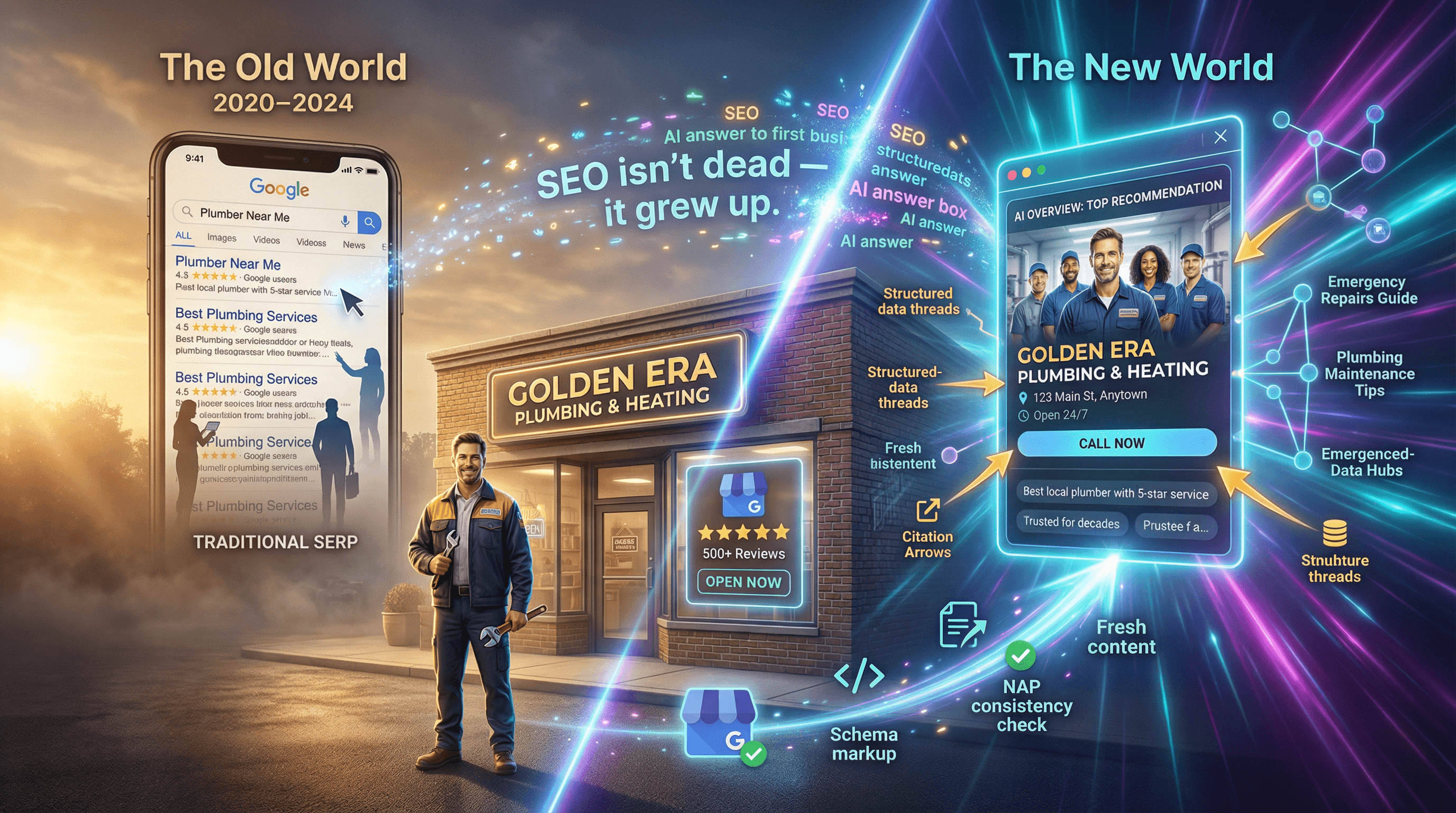Growth Partners
Stop comparing yourself to peers. Discover how to find your true growth partner and achieve sustainable business growth.
It's easy to get caught up looking at what other businesses are doing, especially when they seem to be soaring. You see their wins, their growth, their seemingly effortless success, and it's natural to compare. But here's the thing: that comparison game? It's probably hurting your own business more than you realize. Focusing on everyone else's journey distracts you from building your own unique path and finding what truly drives your growth. Let's talk about why this happens and how to shift your focus back to what really matters for your business.
Key Takeaways
Comparing your business to higher-level peers often uses unfair metrics and ignores their unseen struggles, making it a misleading practice.
Constant comparison can stifle your own business's innovation and erode your motivation, leading to feelings of resentment and a loss of joy in your work.
Break free by recognizing self-sabotage, cultivating a mindset focused on your own progress, and valuing internal achievements over external validation.
Shift focus to your unique value proposition and learn from competition without letting it lead to envy; find a true Growth Partner to support your journey.
Embrace internal benchmarking by measuring your progress against your past self, not others, and seek inspiration rather than direct imitation.
The Illusion Of Peer Success

It's easy to look at other entrepreneurs, especially those who seem to be doing really well, and feel a pang of something – maybe envy, maybe inadequacy. We see the highlight reel, the polished presentations, the big wins. What we don't see is the messy middle, the late nights, the failed attempts, and the sheer grit it took to get there. It's like looking at a perfectly staged photo and forgetting about the hours of setup and editing.
Unfair Metrics And Unseen Struggles
When we compare our business's progress to someone else's, we're often using wildly different yardsticks. They might have had a massive head start, a different market, or even just a lucky break we didn't get. Think about it: someone might be celebrating a huge funding round, but you don't see the years they spent bootstrapping, the personal sacrifices they made, or the team they had to let go. It's easy to focus on their current success without understanding the full story.
The "Fake It Till You Make It" Factor: Many successful people project an image of confidence and control long before they actually feel it. This isn't dishonesty, but a strategy to build momentum and belief.
Hidden Costs: Success often comes with unseen struggles like burnout, strained relationships, or constant pressure. These aren't usually advertised.
Different Starting Lines: Not everyone begins their entrepreneurial journey from the same place. Factors like personal wealth, existing networks, and prior experience play a huge role.
The Unique Path Of Every Entrepreneur
Your business is a reflection of your unique journey, your skills, and your vision. Trying to force it into someone else's mold is like trying to fit a square peg into a round hole. Every entrepreneur faces different challenges and has different strengths. What works for one might be a complete disaster for another. It's important to remember that there's no single, correct way to build a successful business.
The pressure to appear successful can lead to self-sabotage. When things start going well, some entrepreneurs unconsciously find ways to mess it up, often due to deep-seated beliefs about deserving success or the idea that success must always involve struggle.
Focusing On The Wrong Mirror
Constantly looking at others to gauge your own progress is like trying to navigate by looking at someone else's map. It's bound to get you lost. Instead, the most effective mirror is your own past performance. How far have you come? What have you learned? Focusing on your own trajectory helps you see genuine growth, not just a comparison to an often-unrealistic external standard. This internal focus is where real, sustainable progress is made.
The Detrimental Impact On Your Business
It's easy to get caught up looking at what everyone else is doing, especially when it seems like they're all miles ahead. But this constant comparison can really mess with your business, and not in a good way. It's like trying to run a race while staring at the person in first place, forgetting you're on your own track.
Stifling Innovation Through Comparison
When you're always looking sideways at your peers, it's hard to look inward and see what truly makes your business unique. You start to think, "Why didn't I do that?" or "They're so much better at X." This can make you hesitant to try new things. You might stick to what seems safe or what you see others doing, rather than exploring your own creative ideas. This fear of not measuring up can kill the very spark that makes your business special. Instead of innovating, you end up imitating, and that's a fast track to mediocrity.
Eroding Motivation And Drive
Seeing others' successes, especially when they're presented without the messy details, can be incredibly demotivating. You might start to feel like you're not making progress, even if you are. This can lead to a feeling of being stuck, and that's a tough place to be for any entrepreneur. It's like looking at a mountain peak and feeling defeated before you've even started climbing.
The Cost Of Resentment And Lost Joy
Constantly comparing yourself can breed resentment. You might start to feel bitter towards those you perceive as more successful, or even towards your own business for not being
Breaking Free From The Comparison Trap

It’s easy to get caught up in looking at what everyone else is doing, especially when it seems like they’re all miles ahead. You see their successes, their shiny new projects, their glowing reviews, and it’s hard not to measure your own progress against it. But here’s the thing: that kind of comparison is a one-way ticket to feeling stuck and discouraged. It’s like trying to win a race where the finish line keeps moving, and you’re only looking at other runners, not your own pace.
Recognizing the Signs of Self-Sabotage
How do you know if you’re falling into this trap? It’s usually pretty obvious once you start paying attention. You might find yourself feeling a constant sense of inadequacy, even when things are going well for you. Maybe you’re hesitant to share your own ideas because they don’t seem as “good” as someone else’s. Or perhaps you’re spending more time scrolling through other people’s achievements than working on your own business.
Here are some common signs you might be sabotaging yourself through comparison:
Constant self-criticism: You’re always finding fault with your work or your business decisions when you look at others.
Hesitation to act: You delay starting new projects or taking risks because you don’t think you can measure up.
Feeling drained: Instead of feeling motivated by others, you feel tired and uninspired.
Focusing on perceived flaws: You fixate on what you don’t have or what you’re not doing compared to your peers.
When you're constantly looking sideways at what others are doing, you're taking your eyes off the road ahead. This distraction can lead to missed opportunities and a general feeling of being lost, even when you're making progress.
Cultivating a Growth Mindset
Shifting away from comparison starts with changing how you think about success and failure. Instead of seeing things as fixed – either you’re good at something or you’re not – a growth mindset believes that abilities can be developed through dedication and hard work. This means that setbacks aren’t permanent failures, but chances to learn and get better. It’s about seeing challenges as opportunities, not threats.
Prioritizing Internal Progress Over External Validation
Ultimately, the most sustainable way to grow your business is to focus on your own journey. What does success look like for you? What are your goals? When you start measuring your progress against your own past performance and your own defined objectives, you take the power away from external comparisons. It’s about building something that’s authentic to your vision, not just trying to keep up with someone else’s.
Think about it this way:
Track your own metrics: Focus on your own sales figures, customer satisfaction, project completion rates, and personal development goals.
Define your own wins: Celebrate the milestones that matter to your business, regardless of what others are achieving.
Seek feedback internally: Ask your team, your mentors, or even yourself what can be improved, rather than looking to competitors.
This internal focus builds resilience and a stronger sense of purpose, which are far more valuable for long-term success than any fleeting comparison.
Shifting Your Focus To Sustainable Growth
It's easy to get caught up in what everyone else is doing, especially when it seems like they're all miles ahead. But honestly, that's a fast track to burnout and a business that feels more like a chore than a passion project. Instead of chasing after some imagined finish line set by others, let's talk about building something that lasts, something that actually feels good to work on day in and day out.
Embracing Your Unique Value Proposition
Think about what makes your business, well, yours. What problem do you solve that nobody else quite does, or at least not in the same way? This isn't about being the loudest or the flashiest; it's about being authentic. Your unique approach, your specific skills, and even your quirks are your secret sauce. Trying to be a carbon copy of someone else means you're always playing catch-up and never truly shining.
Identify your core strengths: What do you do exceptionally well, even when you're tired?
Pinpoint your niche: Who are you serving, and what specific need are you meeting?
Articulate your 'why': Beyond making money, what's the deeper purpose driving your business?
Leveraging Competition For Learning, Not Loathing
Competition isn't always the enemy. Sometimes, seeing what others are doing can be a useful mirror, not to compare, but to learn. What are they doing that's working? What are they missing? This isn't about copying them, but about understanding the landscape better so you can carve out your own space more effectively.
Instead of seeing competitors as threats, view them as data points. They can reveal market gaps, customer preferences, and innovative strategies you might not have considered. Use this information to refine your own path, not to mimic theirs.
Finding Your True Growth Partner
Who are the people in your corner? Building a business can feel lonely, but it doesn't have to be. Your 'growth partners' aren't necessarily the people with the biggest bank accounts or the most followers. They're the ones who offer genuine support, honest feedback, and a shared understanding of the entrepreneurial journey. This could be a mentor, a small group of fellow founders, or even a supportive friend who just gets it.
Here's who to look for:
Mentors: Experienced individuals who can offer guidance based on their own journeys.
Peer Groups: Other entrepreneurs facing similar challenges who can share insights and commiserate.
Accountability Buddies: People who will check in on your goals and help you stay on track.
Supportive Network: Friends and family who understand the demands of running a business and offer encouragement.
Strategies For A Healthier Business Outlook
It's easy to get caught up in the whirlwind of business, especially when you're constantly seeing what others are doing. But to really grow, you need to step back and build a more solid foundation for yourself and your company. This means focusing on what actually matters for your journey, not just chasing after someone else's finish line.
Celebrating Small Wins And Milestones
Seriously, don't underestimate the power of acknowledging progress. When you're in the thick of it, it's easy to overlook how far you've come. Breaking down big goals into smaller, manageable steps and then actually celebrating each one can make a huge difference. It's like collecting little victories along the way.
Daily Check-ins: Spend five minutes each morning noting down one small thing you accomplished yesterday or plan to achieve today.
Weekly Reviews: Dedicate time at the end of each week to list out your successes, no matter how minor they seem.
Milestone Markers: When you hit a significant target, take a moment to truly appreciate it. This could be a team lunch, a personal reward, or simply a quiet moment of reflection.
Implementing Rituals For Mental Clarity
Our minds can get cluttered with to-do lists, worries, and endless notifications. Creating simple routines can act like a reset button, helping you stay focused and calm. These aren't complicated, just consistent practices that help clear the mental fog.
Building a business shouldn't feel like a constant uphill battle. Integrating small, intentional practices into your day can create pockets of calm and clarity, making the entire process more sustainable and enjoyable.
Think about things like:
Morning Pages: Writing down whatever comes to mind for a few minutes first thing in the morning to clear your head.
Mindful Breaks: Stepping away from your work for 10-15 minutes to do something completely unrelated, like a short walk or some deep breathing exercises.
Digital Sunset: Establishing a time each evening when you put away screens to wind down without digital distractions.
Understanding Your Own Time And Capacity
This is a big one. We often feel like we need to do everything, all the time. But understanding your personal limits and how you best use your time is key to avoiding burnout and making smart decisions. It’s about working smarter, not just harder. You need to be realistic about what you can handle and when you need to rest or delegate. This is where you can really start to build business resilience.
Here’s a simple way to think about it:
Activity Type | Estimated Time Needed | Actual Time Spent | Notes |
|---|---|---|---|
Deep Work (Projects) | 4 hours | 2.5 hours | Frequent interruptions |
Meetings | 2 hours | 3 hours | Ran over, added unscheduled chats |
Admin/Email | 1.5 hours | 2 hours | Batching could save time |
Breaks/Rest | 1 hour | 0.5 hours | Felt too busy to stop |
Looking at this, you can see where time is getting away from you and where you might be overextending yourself. It’s not about judgment, it’s about awareness so you can adjust.
The Power Of Internal Benchmarking
Measuring Progress Against Your Past Self
Look, it's easy to get caught up watching what everyone else is doing. You see their shiny new office, their big client wins, their social media buzz, and it's natural to feel a pang of something – maybe envy, maybe inadequacy. But here's the thing: their journey isn't yours. Their metrics aren't your metrics. The real game-changer for your business isn't looking sideways; it's looking backward at where you started.
Think about it. When you started your business, what were your goals? What were your capabilities then? Now, compare that to where you are today. Have you increased your revenue? Have you improved your processes? Have you learned new skills? Tracking your own trajectory is the most honest way to see how far you've actually come. It's about celebrating your personal victories, not measuring yourself against someone else's highlight reel.
Identifying And Challenging Limiting Beliefs
Often, when we compare ourselves to others, it's because we've got some nagging voice in our head telling us we're not good enough. Maybe you believe you're not smart enough, not experienced enough, or that your idea just isn't as good as someone else's. These are limiting beliefs, and they're like invisible walls holding your business back.
Here's how to start chipping away at them:
Identify the thought: When you catch yourself comparing, ask: What specific thought is running through my head? Is it "I'll never be as successful as X" or "My product isn't as polished as Y"?
Challenge its validity: Is that thought actually true? What evidence do you have that it's 100% accurate? Often, you'll find it's based on assumptions or incomplete information.
Reframe the belief: Instead of "I'll never be as successful as X," try "X has achieved Y, and I can learn from their strategies to achieve my own version of success."
Focus on action: What's one small step you can take today that moves you forward, despite that limiting belief?
The danger of external comparison is that it often leads us to believe that success is a fixed destination, a point where everyone else has arrived and we haven't. This couldn't be further from the truth. Success is a process, a continuous evolution, and your own past performance is the most relevant benchmark for your future growth.
Seeking Inspiration, Not Imitation
It's perfectly fine, even smart, to look at what successful people are doing. The key is to shift your mindset from imitation to inspiration. When you see a competitor or a peer doing something well, don't just think, "I wish I could do that." Instead, ask yourself:
What problem are they solving?
What strategies are they using that I could adapt?
What can I learn from their approach that fits my own business context?
This approach turns external achievements into learning opportunities. You're not trying to copy them; you're trying to understand the principles behind their success and apply them in a way that makes sense for your unique business. It's about finding your own path, informed by others, but ultimately forged by your own efforts and vision.
So, What's the Takeaway?
Look, it's easy to get caught up watching what everyone else is doing, especially when they seem to be miles ahead. But honestly, that's a fast track to nowhere good for your own business. Instead of staring at their highlight reel, focus on your own game. What are your goals? What small steps can you take today to move closer to them? Celebrate your own wins, no matter how small they seem. Your journey is yours alone, and trying to match someone else's path will only distract you from building something truly great. Get back to basics, do your work, and trust the process. Your business will thank you for it.
Frequently Asked Questions
Why is comparing my business to others usually a bad idea?
It's like comparing apples and oranges! Everyone's business journey is different. You see their wins, but not their struggles. Focusing on others takes away energy from building your own unique business.
How does comparing myself to successful peers hurt my business?
It can make you doubt your own ideas and stop you from trying new things. You might feel discouraged, which makes it harder to stay motivated and enjoy running your business. It can also lead to feeling grumpy or jealous.
What's the first step to stop comparing myself to others?
First, notice when you're doing it. Recognize that it's a habit that doesn't help. Then, try to focus on what makes your business special and what you're good at, instead of what others are doing.
Instead of comparing, how can I focus on growing my own business?
Think about what makes your business stand out. Instead of feeling bad about competitors, learn from them. See what they do well and how you can get even better yourself. Find people who support your growth, not make you feel small.
What are some simple ways to feel better about my business progress?
Celebrate the small wins! Did you finish a task? Great! Give yourself a pat on the back. Also, set aside time to relax and clear your head. Understand that you can only do so much in a day, and that's okay.
What does 'internal benchmarking' mean for my business?
It means looking at how far you've come. Instead of comparing to others, compare your business today to your business from last month or last year. See how you've improved and what you've learned. Get inspired by others, but don't try to be exactly like them.
























































































